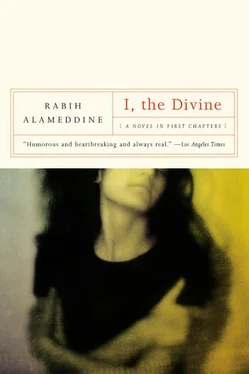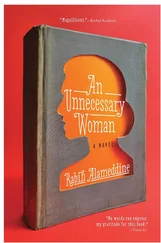By one-twenty, everyone had arrived. By one-thirty, they were seated at the dining table, all ten of them. Timing was essential for Mustapha. By two they would be done.
The conversation at the table covered a lot of ground. Ramzi’s health, his work. Mustapha asked his son about clients. Ramzi practiced medicine in a part of San Francisco where clients were not all genteel and white, but a procession of multicolored flesh, a new cause of consternation for his father. Even Saniya was surprised at her son’s choices, not prejudice, but a seeming distortion of the immaculate image she had of him. Mustapha’s pointed questioning had its usual effect on Ramzi. He raised and lowered his eyelids slowly while his father spoke, a sure sign of his waning interest.
“How’s Sarah doing?” Saniya asked, coming to her son’s rescue. “She called today to wish us a happy anniversary. I was surprised she remembered.”
“Of course, she would remember,” Majida said. This was a conversation the whole family could participate in. “Ramzi must have told her before he left.”
“I did tell her. She’s doing fine, still as lost as ever.”
“I wish she’d move back here where she belongs,” Mustapha said. Always the same refrain.
“She never will, Father. You know that.”
“Is she still writing her book?” Amal asked.
“I’m not sure. She hasn’t mentioned it in a while.”
“That girl was just spit out by her mother. She behaves in exactly the same way.” Mustapha’s statement was the usual one, which ended any conversation about Sarah. Saniya could see the girls wanting to find out more, but they would wait until Mustapha had gone in for his afternoon nap. Amal would want to know whether her sister was still obsessed with the man who had dumped her. They could not talk about Sarah’s relationships while her father was present. They could not talk about Ramzi’s lover either. Relationships, the unmentionable topic.
“Can Tariq drive me this afternoon?” her son asked.
“No. I need him. Can you drive yourself?”
“Sure.” He turned toward his father. “Are the players coming this afternoon?” Mustapha simply nodded.
The lunch was over. Two o’clock. Mustapha stood up. “I guess we’ll see you all tomorrow.” Laughter all around.
“Bring the kids tomorrow. It’s Saturday.”
“Ramzi should visit more often.”
By two-fifteen, Mustapha and his wife were in bed for a brief siesta. At two forty-five, Miki came in with the coffee. By three the cardplayers began arriving. They had been playing quatorze every day since before Saniya was married. The same five people every single day, from three-thirty till eight. All of them worked half days, even though they were all professionals. Mustapha played quatorze on his wedding day — they did not have a honeymoon — on the day Rana was born, the day Majida was born, and even the day Ramzi was born.
She started dressing when they were four. She would greet the fifth and leave as was her habit. For the first ten years, she was there every day making sure all their needs were met. She finally began to train the maids to do her job. When the doorbell rang, she was the one to open the door.
“How’s the little business lady?”
“Fine. How are you today?”
“Going off to work?”
“Someone has to.” The last she said as the elevator door closed.
* * *
By four-thirty, Tariq was going down on her, his Hizballah beard proving to be functional after all.
Tariq lay with his arms around her, her back against his chest, their feet touching. He fell asleep nuzzling her neck, a hand holding her breast. She wept, silently, careful not to wake him. Tears dropping into her open mouth, she whimpered softly.

Il faisait chaud ce jour-là. Elle avait porté sa longue robe noire et fleurie. Elle aimait cette robe. Sa belle-mère disait qu’elle la rendait trop maigre. Mais elle en aimait le fin tissu frais. La chaleur l’étouffait. Elle était au bord de la route depuis bientôt dix minutes, et aucun taxi ne semblait vouloir s’arrêter. Ses cheveux lui collaient au front. Elle détestait Beyrouth en été. La chaleur et l’humidité rendaient la ville sale.
Une voiture s’arrêta. Elle regarda furtivement le conducteur, puis, lui fit signe de la tête qu’elle n’en avait pas besoin. On lui avait toujours dit de se méfier des jeunes conducteurs. Elle regarda sa montre. Déjà six heures. Elle était lasse et fatiguée. Elle voulait rentrer à la maison. Les séquelles de sa récente maladie commençaient à se manifester. Il faisait tellement chaud qu’elle se sentait au bord de l’évanouissement.

It was hot that day. Sarah wore her long black dress with a flower motif, tiny yellow-and-white daisies and red poppies. She loved the dress. Her stepmother had told her it made her appear too thin, the black making her skin look too pale. But she loved the fine cloth, billowing linen perfect for the weather. The heat was suffocating. She had been waiting at the side of the road for more than ten minutes and not a single taxi or jitney seemed to want to stop. A couple had passed filled with the maximum five passengers. Her hair stuck to her clammy forehead. She hated Beirut in the summer. The heat and humidity made the city filthy.
A car stopped. She glanced at the driver furtively, then signaled him with a slight movement of her head that she did not need a jitney. She was always told to be wary of young taxi drivers. She looked at her watch. Already six o’clock. She was tired and weary. She wanted to be home. The symptoms of her recent illness were beginning to reappear. If it were not for the bout of pneumonia, she would have been up in the mountains instead of in Beirut. When she got sick, the family packed their summer home, returning early to Beirut to make sure she could be hospitalized. She ended up spending a couple of days in the hospital when her fever ran too high.
It was so oppressively hot, she felt faint.
A white car stopped, grimy, needing a vigorous wash. She looked inside. The driver was a man about as old as her father. In the back sat a young man of about twenty. She was so tired, she decided to take the two seats next to the driver. After all, she knew she did not have to worry because the driver was a seat away and she was not alone.
She rode in the car distracted, thinking of other things: the strange behavior of her boyfriend, the engagement of her sister, the pleasures of air-conditioning.
She did not know exactly when she no longer recognized the route. She told the driver this was not the road to her house. The driver looked at her, smiling, showing teeth that turned her stomach. The passenger seemed imperturbable. What was going on? She told the driver to stop, but he addressed her with the same nauseating smile. This was strange. She realized she must escape, get out of the car. The man in the back seemed indifferent to her complaints. Why would he not help her? She should get out, but the car drove fast in a neighborhood she had never seen before. She was not afraid. Not yet. She felt overwhelmed, unsure what to do, but not afraid yet. She knew she must act, and quickly. She put her hand on the door handle, but she felt a coldness on her slick temple, a metal coldness. She did not dare look back. The driver landed his large brown hand on her arm. When she tried to free her arm, his grip tightened, like a vice. The contrast between the whiteness of her arms and the dark of his fingers frightened her. Her dry throat tightened when she heard a click. The click of a revolver. She felt the veins in her temple pulse with such force, she thought the hand holding the gun would certainly feel the palpitations. It was only at that moment that she realized the passenger held the gun. She also realized she was at their mercy. She tried to master her mounting terror. She anxiously calculated the value of everything she had on her. This process reassured her. She would give them the gold watch, a gift from her father. She would give them the gold chain she had received from her stepmother six months ago for her sixteenth birthday. And of course, all the money she had on her.
Читать дальше














